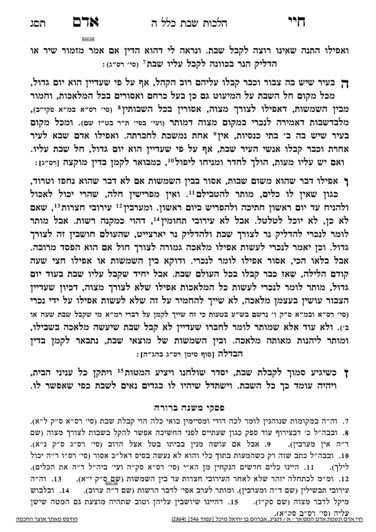We are beginning siman 4. The Chayei Adam writes that if one davens maariv early on Friday night, they accept Shabbos through their davening. They can not do melacha, even if they explicitly stipulate that they do not want to accept Shabbos through their davening. The Chayei Adam is pointing out that the act of davening maariv–and saying words such as mekadeish hashabbos or responding to barechu–causes a person to accept Shabbos. The Chayei Adam adds that, in his opinion, saying mizmor shir would function similarly. Until now, we have discussed tosefes Shabbos taking effect automatically, and if one wished to accept Shabbos early, it would require some form of an acceptance. Here, we see that making these declarations–whether barechu, mizmor shir, or lighting candles–serve as accepting Shabbos.
The Mishnah Berurah points out that people would accept Shabbos by reciting mizmor shir in places where they did not recite lecha dodi. In places where lecha dodi is recited, they accept Shabbos by reciting bo’i beshalom.
We have learned that tosefes Shabbos is a mitzvah deoraysa. If so, it would be appropriate to pause for a moment to have in mind that they are saying bo’i beshalom in order to accept tosefes Shabbos.
In siman 5, the Chayei Adam introduces the concept that if a community accepts Shabbos at a certain time, individuals in the community who have not yet accepted Shabbos are forced to accept the decision of the community and keep Shabbos from that point. The Chayei Adam writes that when there is one shul in a town, and the majority of the community has accepted Shabbos, it brings the status of Shabbos into the community, and individuals are forced to accept Shabbos as well.
Rav Moshe points out that, in his opinion, this halacha only applies if the tzibbur accepts Shabbos for the purpose of the mitzvah of accepting Shabbos. Once they are accepting Shabbos for the purpose of a mitzvah, there is a concept that when a community takes upon itself a davar tov, it becomes binding on all members of the community, because the minhagim tovim of a community become binding on the entire community. However, if they are only accepting Shabbos early for the purpose of convenience, it is not binding on the remainder of the community.
Not everyone agrees with Rav Moshe, but one can rely on it in pressing circumstances. For example, the case Rav Moshe discusses is a person driving up to a bungalow colony, when the bungalow colony accepted Shabboos early. If they only accepted Shabbos early for the convenience of early Shabbos, that person is not bound to accept Shabbos with the community.
Summary
- Davening maariv early on Friday night causes one to accept Shabbos.
- Tosefes Shabbos is a mitzvah deoraysa, so it is appropriate to have in mind that they are fulfilling the mitzvah of tosefes Shabbos when accepting Shabbos.
- If a community accepts Shabbos early, it becomes binding on all individuals in the community. However, Rav Moshe holds this only applies if the community accepts Shabbos early for the purpose of the mitzvah, and not only for convenience.



